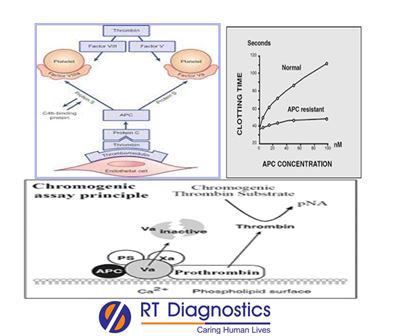Activated Protein C - Resistance (APCR):
CLINICAL INFORMATION :
Activated protein-C, also called Auto-prothrombin-IIA and blood coagulation factor XIX, is a zymogen, the activated form of which plays an important role in regulating anti-coagulation, inflammation cell death and maintaining the permeability of blood vessel walls in humans. Activated protein-C exerts its anticoagulant activity primarily through the inactivation of coagulation factors V-a and VIII-a, which are required for factor-X activation and thrombin formation for the clot. Hence this test Activated protein-C is a part of the evaluation of patients with coagulation disorders and identifies patients who are deficient in protein-C and/or S. The importance of this test is that the deficiency of activated protein-C would result in a risk of clot formation since there is decreased or no inhibitory feedback on coagulation cascade by protein-C. Some causes for deficiency of Activated protein-C are vitamin-k deficiency, warfarin therapy, severe liver diseases, disseminated intravascular coagulation (DIC), severe bacterial infections in the young, and some chemotherapy drugs. Symptoms of Activated protein-C deficiency are deep vein thrombosis (DVTs) in leg veins causing pain, discoloration and swelling, pulmonary embolism that leads to chest pain, fever, dizziness, coughing, and shortness of breath, and in newborn babies a condition called neonatal purpura.
Elevated levels of Activated protein-C are seen in conditions like increased hepatic insulin resistance in patients with diabetes and hypertriglyceridemia, nephrotic syndrome, with use of anabolic steroids, oral contraceptives, alcohol, and with increasing age. But there is no clinical significance, as they are not associated with any major medical problems as of now till date.

General instructions:
Sample Requirement: Specimen - Blood sample drawn from the vein. Test Preparation: None.
NOTE - Sample for specimen collections may vary based on the patient’s condition/cases according to the patient’s presentingcomplaints / signs or symptoms:
SPECIMEN REQUIREMENT (Special or Rare Cases) - As instructed and guided by Physician / Clinician / Pathologist / as per Laboratory’s requirements, according to procedures and protocols.
This Multi-Specialty Clinical Referral Laboratory “RTDIAGNOSTICS” provides precise and accurate tests with an extensive range of testing services to the medical centers to help in the diagnosis and identification of pathology in the test specimens for infectious diseases and also to evaluate the function of organ systems of the patient. It prevents further complications and helps to stabilize and restore health to near normalcy at the earliest without delay.



